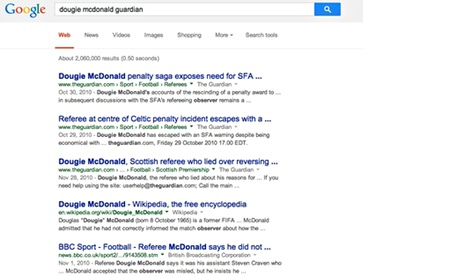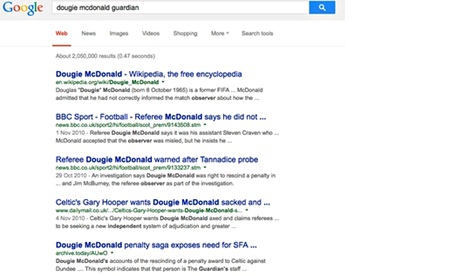Guardian articles have been hidden by Google
Publishers must fight back against this indirect challenge to press freedom, which allows articles to be 'disappeared'. Editorial decisions belong with them, not Google
When you Google someone from within the EU, you no longer see what the search giant thinks is the most important and relevant information about an individual. You see the most important information the target of your search is not trying to hide.
Stark evidence of this fact, the result of a European court ruling that individuals had the right to remove material about themselves from search engine results, arrived in the Guardian's inbox this morning, in the form of an automated notification that six Guardian articles have been scrubbed from search results.
The first six articles down the memory hole – there will likely be many more as the rich and powerful look to scrub up their online images, doubtless with the help of a new wave of "reputation management" firms – are a strange bunch.
Three of the articles, dating from 2010, relate to a now-retired Scottish Premier League referee, Dougie McDonald, who was found to have lied about his reasons for granting a penalty in a Celtic v Dundee United match, the backlash to which prompted his resignation.
Anyone entering the fairly obvious search term "Dougie McDonald Guardian" into google.com – the US version of Google – will see threeGuardian articles about the incident as their first results.

Screenshot of results on Google.comType the exact same phrase into Google.co.uk, however, and the articles have vanished entirely. McDonald's record is swept clean.

Screenshot of results on Google.co.ukThe other disappeared articles – the Guardian isn't given any reason for the deletions – are a 2011 piece on French office workers making post-it art, a 2002 piece about a solicitor facing a fraud trial standing for a seat on the Law Society's ruling body and an index of an entire week of pieces by Guardian media commentator Roy Greenslade.
The Guardian has no form of appeal against parts of its journalism being made all but impossible for most of Europe's 368 million to find. The strange aspect of the ruling is all the content is still there: if you click the links in this article, you can read all the "disappeared" stories on this site. No one has suggested the stories weren't true, fair or accurate. But still they are made hard for anyone to find.
There might be a case for saying some stories should vanish from the archives: what about, say, someone who committed a petty crime at 18, who long since reformed and cleaned up their act? If at the age of 30 they're finding that their search history is still preventing them getting a job, couldn't they make the case that it's time for their record to be forgotten? Perhaps – it's a matter of debate. But such editorial calls surely belong with publishers, not Google.
As for Google itself, it's clearly a reluctant participant in what effectively amounts to censorship. Whether for commercial or free speech reasons (or both), it's informing sites when their content is blocked – perhaps in the hope that they will write about it. It's taking requests literally: only the exact pages requested for removal vanish and only when you search for them by the specified name.
You can still find a vanished Dougie McDonald page if you search "Scottish referee who lied"; it only disappears when you add his name to the search.
If you search any EU Google site for anything resembling a name, you'll see a warning your results may be restricted. Yet, there's an even better workaround which the search giant has left open. If you go to the Google homepage, and look in the bottom right-hand corner, you'll see a link saying "Use Google.com".
Do that – or switch to another search engine, such as DuckDuckGo, which has no EU footprint and also doesn't track cookies – and for now, you'll see the full unfiltered results.
But this isn't enough. The Guardian, like the rest of the media, regularly writes about things people have done which might not be illegal but raise serious political, moral or ethical questions – tax avoidance, for example. These should not be allowed to disappear: to do so is a huge, if indirect, challenge to press freedom. The ruling has created a stopwatch on free expression – our journalism can be found only until someone asks for it to be hidden.
Publishers can and should do more to fight back. One route may be legal action. Others may be looking for search tools and engines outside the EU. Quicker than that is a direct innovation: how about any time a news outlet gets a notification, it tweets a link to the article that's just been disappeared. Would you follow @GdnVanished?

 Ironically "Farenheit 451" has come out of nowhere to number 39
Ironically "Farenheit 451" has come out of nowhere to number 39

Comment